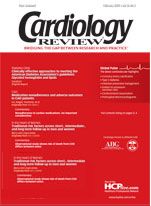Publication
Article
Cardiology Review® Online
Can cholesterol be lowered too much?
The combination of heart failure and hyperlipidemia is not uncommon, and many patients are treated for both conditions. In their article, Drs. Fukuta and Little (page 25) are concerned that too low cholesterol levels—as a result of aggressive lipid lowering regimens using HMG-CoA reductase inhibitors (statins)—may be associated with worse survival in patients with diastolic heart failure and normal left ventricular ejection fractions (LVEF), just as they have been reported in patients with systolic heart failure (depressed LVEF). Accordingly, the study they devised had half of their diastolic heart failure patients receiving statins and half receiving placebo. While the two groups were not always similar with regard to certain clinical features and coronary artery disease risk factors, they were similar in New York Heart Association functional class and echocardiographic indices.
The authors found that treatment with statins was associated with significant improvement in survival. One statin did not appear different from another in this regard. They surmise, and I agree, that the impressive survival benefits are probably due to both the statins’ lipid-dependent and lipid-independent mechanisms of action, especially since many of their statin patients had underlying coronary artery disease. The anti-inflammatory properties of statins are often suspected of playing a key role in their beneficial effects on morbidity and mortality in coronary artery disease patients, irrespective of the lowering of cholesterol levels. Other possible nonlipid mechanisms include improvement in renal function and diabetes, both of which were common in these patients. The left ventricle itself can be affected by improvement in relaxation and stiffness pa-rameters, the hallmark of diastolic dysfunction.
The results of this study have important clinical implications since these two comorbid conditions are so common, as illustrated by their case report. Drs. Fukuta and Little have provided reassuring data for practitioners who treat these patients on a day-in and day-out basis, and have been concerned about possible deleterious effects of statins in this type of congestive heart failure.
